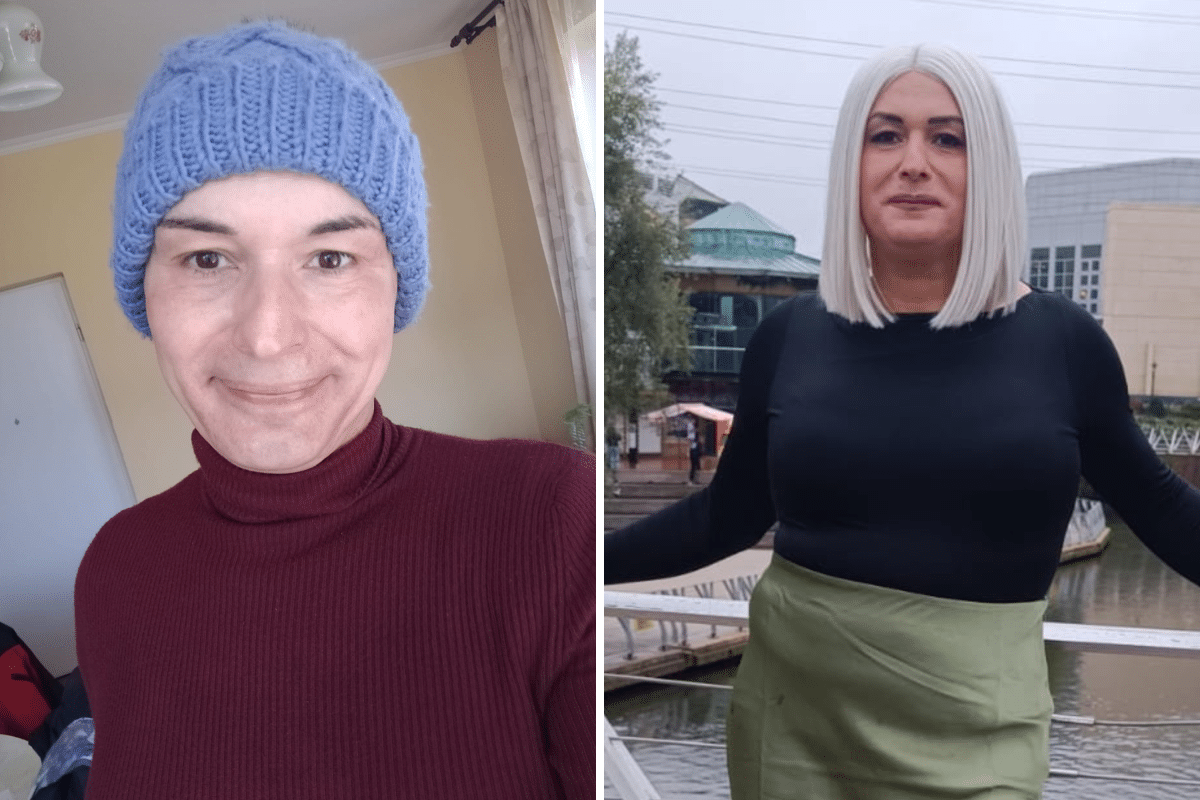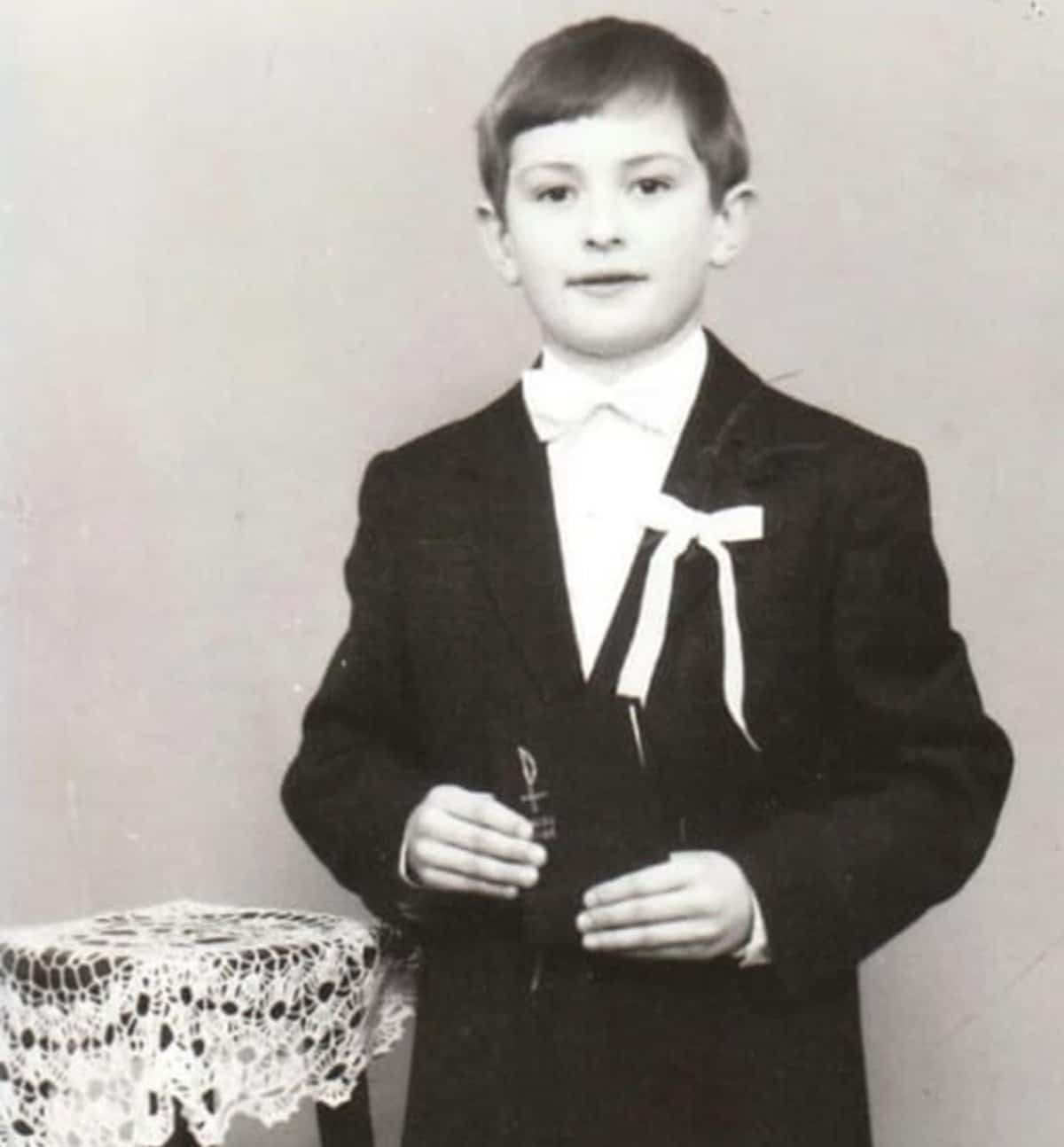A transgender woman has opened up about how she spent $10,500 on gender-affirming surgery after getting divorced—the culmination of a seven-year transition from male to female and decades of living a secret life.
Originally from Poland, Katie Bocon—previously known as Pawel—told Newsweek that her path to becoming her true self took years of emotional, physical and psychological transformation.
The 50-year-old was married to a woman for over a decade while concealing her true identity, which eventually led to their divorce.
“I had nothing to lose, as my wife had left,” the project manager said, recalling the year she came out as transgender, aged 44.

Katie Bocon before transitioning, left, and today, right. She was married to a woman for over a decade while concealing her true identity.
TikTok/@katiebocon
‘A Secretive Life’
“I didn’t just wake up one day and decide to become a woman,” Bocon said. “I led a secretive life before transitioning.”
She recalled trying on her mother’s heels, dresses and makeup as a child when her parents weren’t around, followed by cross-dressing in her adult years.
“As a child, I hated the male parts of my body. I was frustrated and confused,” she said.
“As I got older, I was so secretive and undercover about cross-dressing, I never got caught.”
Bocon’s first major attempt to suppress her identity came in her adult years when she fell in love and married in the early 2000s.
“I was afraid to share my secret with anyone, but there was always something missing,” she said. After moving to the U.K. in 2004, she confided in her then-wife that she sometimes dressed up in women’s clothes, a revelation that deeply affected her partner.
Bocon told Newsweek: “It was traumatic for her. She never expected it, but I hoped she would accept it.”

Bocon as a child. At just 8 years old she was already exploring her identity by secretly trying on her mom’s clothes.
Provided by Katie Bocon
Despite this, Bocon, who has two children, continued to suppress her feelings. “I thought having kids would help, but my body demanded that I do something about it,” she said.
“I had anxiety, depression and disturbed sleep.”
Bocon took a job requiring frequent international travel to escape her feelings, but it didn’t help. In 2014, while living in Norway for work, she fell into a deep depression. But a conversation with a stranger who happened to be a therapist became a turning point. The two began a long-term therapeutic relationship that helped Bocon explore her identity.
Eventually, she began seeing a Polish therapist in the U.K., to whom she admitted, “I want to come to the appointments as a woman.”
Slowly, Bocon began expressing herself more openly and would look forward to her Friday evening therapy sessions. “I would spend Fridays practicing walking in heels then I would get changed into my clothes and do my makeup in the car before” she said. “Afterward, I’d throw the clothes away.”
Coming Out As Transgender

Bocon pictured after she came out as transgender. She told Newsweek that she is glad she did not rush into having gender-affirming surgery.
TikTok@katiebocon
In 2016, Bocon felt she couldn’t hide anymore and came out, which led to separation and divorce. During this year, she reached out to her doctor for help.
“I told the doctor ‘I think I am transgender,'” Bocon said, adding, “at the time, I was severely depressed and the doctor supported me. She saved my life.”
In January 2017, Bocon began hormone replacement therapy and spent the next few years waiting for appointments at gender clinics and consultations with specialists.
“I told my son when he was eight that ‘I’m planning to become a woman,’ and he said, ‘That’s impossible,'” she said. But over time, Bocon’s children began to accept her new identity. “They suggested the name Katie, however they still call me Dad. I don’t mind.”
Bocon then began to embrace her identity. “I started buying clothes and keeping them to see how I felt,” she said. She even started dressing up with her children, who are now teenagers. By this time, her marriage had ended.
‘Playing With Identity Expression Is Normal’
Newsweek spoke to Anneka Buehler, a licensed graduate professional counselor who specializes in sex therapy, LGBTQ+ mental health care and neurodiversity.
Buehler is also vice president of The Buehler Institute, an organization specializing in training mental health professionals and health care providers in human sexuality and sex therapy.
The Washington, D.C.-based counselor said: “Playing with identity expression is a normal part of human development, and can include items that express gender like clothing, hairstyling, cosmetics and accessories like binders and packers. It can be a wonderful way to enhance awareness of what feels most authentic and comfortable.
“To be clear, social transitioning is not the first step on a linear path to surgical intervention, and authentic gender expression can look different from individual to individual.”
“Performing gender in a particular way or for a particular amount of time is not an appropriate prerequisite for access to puberty blockers,” Buehler added, and said that the medicines are a safe and effective way to “essentially hit the ‘pause’ button on puberty for adolescents.”
“It provides young people with the valuable time they need to engage in gender identity exploration,” she said.
Finally ‘At Peace’

Bocon with two nurses at the hospital in Bangkok, Thailand. She had gender-affirming surgery there in 2023, after years of emotional preparation and therapy.
TikTok/@katiebocon
In March 2023, after years of emotional preparation and therapy, Bocon flew 6,000 miles to Bangkok, Thailand, for gender-affirming surgery costing £8,000 ($10,500 USD).
Bocon said that she is glad that she didn’t rush into surgery and praised therapy for helping her understand her feelings, adapt to her new life and, most importantly, accept herself.
“Therapy is essential to figure out who you are,” she said. “Once you have surgery, it’s done—there’s no going back.”
“I like myself as I am now. I’m happy and at peace,” she added.
Bocon acknowledged the public scrutiny she sometimes faces but handles it with grace.
She said: “In public, people have said, ‘It’s a dude,’ but I have a good sense of humor. I just pout or wink at them, and they lose interest quickly.”









